Diabetes is a "chronic killer", more torturous than cancer, what changes in the body to be careful?
Diabetes is indeed a chronic killer, with chronic elevated blood glucose as the main manifestation, due to its only ability to lower blood glucose insulin can not lower blood glucose and lead to sustained elevation of blood glucose and cause cardiovascular and cerebrovascular disease, renal damage, retinopathy, diabetic foot, neurological lesions, in the case of infections, injuries, and other human body to be struck by the situation will lead to diabetic ketoacidosis, diabetic hyperglycemia hyperosmolarity and other acute complications. Acute complications such as diabetic ketoacidosis, diabetic hyperglycemic hyperosmolar state, etc., so it is very important to recognize and diagnose diabetes as early as possible.
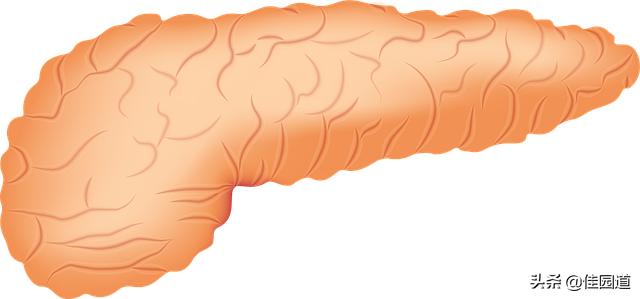
What are the signs of diabetes?
1, elevated blood glucose caused plasma osmolality increase and cause patients to urinate more.
2. Increased drinking due to increased urination causing people to be thirsty.
3, people's peripheral tissues can not make good use of elevated glucose, because humans need to move and work and cause the body's own reserves of protein and fat decomposition to provide energy, resulting in people appearing to be thin and fatigue and weight loss, and easy to cause hunger and lead to always want to eat.

4, some patients can appear skin vulva itching.
5, elevated blood sugar can cause people to see things appear unclear, that is, blurred vision.
6、Part of the patient will appear panic, weakness, sweating and other reactive hypoglycemia as the first manifestation.
7. Recurring body and foot manicures or fire boils on the skin.
8. Pain or pain hypersensitivity in the lower limbs or sensory abnormalities.
9. The skin appears to be sweaty, less sweaty or even haneless. Dry skin and cold hands and feet. The soles of the feet are always long calluses or long corns.
Clinically, it is difficult to determine the level of blood glucose only based on these manifestations, and there are many patients who will not show any signs and symptoms, not to mention these manifestations, so to know whether there is diabetes is the main regular monitoring of blood glucose and routine physical examination.
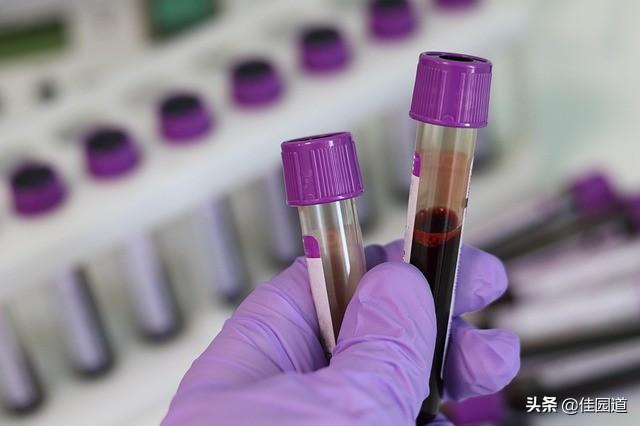
(This content is for informational purposes only.)
In today's world, no one may be unfamiliar with the mention of diabetes. As one of the common chronic diseases, diabetes is plaguing more and more people, and the trend is getting younger.
Diabetes is a "chronic killer", more torturous than cancer, what changes in the body to be careful?
As we all know, diabetes is a lifelong disease, and once diagnosed, it is generally incurable. For diabetic patients, the most torturous is a variety of large and small complications, from small fundus lesions to large vascular lesions, all of which make patients suffer, and even fatal. According to statistics, the complications caused by diabetes up to more than 100 kinds of diseases, is currently known as the most complications of a disease.

According to clinical statistics, more than 70% of diabetic patients suffer from various complications all year round. The occurrence of diabetic complications are in the long-term blood sugar out of control on the basis of the occurrence, with the prolongation of the course of the disease, if the patient's blood glucose is not up to standard for a long time, 5 years, 10 years later, suffering from a variety of complications is inevitable. From this point of view, diabetes is indeed considered a "chronic killer", and like cancer, once the complications occur, it will be a long-term suffering of patients, only the severity may be different from cancer. In any case, the occurrence of diabetes should be taken seriously.
So, what are the changes in the body before the onset of diabetes? Unlike high blood cholesterol and high blood pressure, the body will show signs of diabetes when it occurs, and the symptoms are generally very typical, i.e., what we call "three more and one less" symptoms, and of course, there are some atypical other symptoms.

1. Typical symptoms:That is, more drinking, more eating, more urination, and weight loss. Feeling a sudden and inexplicable increase in daily water intake and always feeling hungry, an increase in urination and more frequent trips to the toilet, as well as inexplicable weight loss without deliberate weight loss are typical symptoms of the onset of diabetes, and must be taken seriously enough.
2. Atypical symptoms:In addition to the above typical symptoms, when diabetes occurs, it will also be manifested in other systemic symptoms, such as wounds should not be healed, easy to get infected; general weakness, easy to fatigue, especially after meals, easy to feel sleepy, weakness; generalized persistent itching of the skin, the conventional treatment has no way to effectively alleviate; skin folds of the black pigmentation, serious acanthosis nigricans, psoriasis; tongue thick, white, with all kinds of Oral diseases; redness and swelling on the back of the hands; numbness of the fingers or accompanied by a tingling sensation, like ants crawling and so on, these are also signs of diabetes.

3. Manifestations of aggravated diabetes:Diabetes mellitus is a progressive development of a disease, if you find that the previous symptoms worsened or some new symptoms appear, it predicts the aggravation of the disease and must be taken seriously. For example, aggravation of the symptoms of three more and one less; unstable blood glucose, large fluctuations or frequent hypoglycemia; frequent serious infections, such as oral, skin and foot infections; gradual loss of vision; numbness and pain in the hands and feet, or sensory loss, loss of sensation; increase in urinary foaming, swelling of the eyelids and lower limbs; frequent panic and chest tightness, breathlessness, dizziness, fatigue; intermittent claudication, walking with an abnormal posture, and easy to have muscle soreness and swelling.Painful sensations; symptoms of gastrointestinal discomfort, odor in the exhaled breath, and so on. The appearance of these symptoms signals an aggravation of diabetes and requires vigilance.
I am Pharmacist Wang, dedicated to helping you manage your body by explaining complex and difficult disease knowledge in plain words. Your likes are my greatest motivation! Also, if you have a family member who suffers from diabetes, please pass this article on to them!
Be careful if you are in the early stages of diabetes when you experience the following changes in your body.
1. Sleeping with severe snoring. Research shows that snoring is an important risk factor for diabetes, and sleep apnea syndrome is closely related to diabetes. Usually obese, relatively short chin, short neck signs of people, sleep is love snoring. Snoring and diabetes are closely related.
With sleep apnea syndrome, it appears that the person is sleeping, but in fact, the person is not asleep. The secretion of stress hormones in the body is increased at this time, which makes it easy for insulin resistance and blood sugar abnormalities to occur. After snoring improves, blood sugar can also be controlled.

2. ChuanZi lines appear on the forehead. Such a person is easy to be in a state of thought or anxiety, which is called negative emotion in medicine. According to information, 4%-10% of diabetic patients are depressed, depressed mood is easy to induce diabetes. Emotional stress has a great impact on blood glucose, and over-excited emotions can easily lead to increased blood glucose. Regulating emotions can effectively control blood sugar.
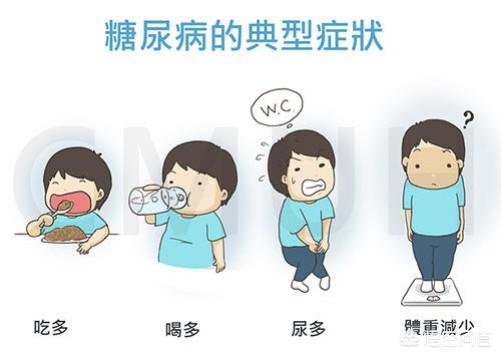
3. Facial flushing. This may indicate high blood pressure, which often occurs in conjunction with diabetes mellitus, and hypertension is one of the risk factors for diabetes mellitus.
4. The tongue moss on the Chenpi moss. It is closely related to diabetes, the formation of Chenpi moss is because the entire gastrointestinal tract of digestion, absorption and metabolism of the function of the weakening of the food is not good metabolism in a timely manner to excrete the accumulation of food, resulting in the gradual thickening of the tongue moss. Normal people's tongue coating light red tongue thin white moss, while patients with diabetes tongue coating is very thick.

5. Stature and diabetes are also inextricably linked. With a large stomach, thin belly, feel the belly feel hard, hands, feet, buttocks fat, too good appetite. These typical characteristics of the crowd, belonging to the real evidence of Zhongtu Yonglag, usually appearing in the young people, accompanied by a dislike of sports, movement is sweating, fatigue and other symptoms.
If accompanied by the phenomenon of Chenpi moss, it means that it already belongs to the stage of pre-diabetes, is a high-risk group of people suffering from diabetes, you should immediately raise the vigilance, after meals to check the blood sugar.
I hope you find all of the above helpful.
When it comes to diabetes, many people hear about it and want to stay away from it. This is not only diabetes will accompany you for a lifetime, but also it will induce many complications, to bring the patient's body double pressure, pain and distress. And there are relevant data show that in our country there are about 100 million diabetic patients, and there are 500 million people in the pre-diabetes stage. In other words, nearly half of the people in our country are at risk of diabetes.
The best and most direct way to confirm the diagnosis of diabetes is to go to the hospital and have a blood glucose test. Usually when doing a blood glucose test, you must eat a good dinner the day before and skip breakfast after waking up the next day, and then follow the doctor's instructions to do a fasting blood glucose test, which will show a blood glucose value. When either the fasting glucose test or the two-hour postprandial glucose test is in the pre-diabetic range, then a review is needed. If the results are the same on both occasions, then the diagnosis of diabetes is basically confirmed.
Of course, life for some reasons, some people can not or do not want to go to the hospital for examination, but also through their own body of some abnormal reaction to the initial judgment. Here we come together to understand, see if you have been hit:
A sudden increase in the amount of meals in your daily diet and eating a lot at a time, but your stomach will still still feel hungry.
- Vision appears blurred and a steady loss of vision can be clearly felt.
- A bad taste in the mouth, which is different from normal bad breath, no matter how much you freshen up your mouth, it still tastes like a rotten apple.
- In the middle of life, you often feel panic, dizziness and lightheadedness, and your body feels like the kind of weakness and powerlessness that you have not eaten and have been starving for days.
- Tingling in the hands and feet, and even in the shoulders, occurs in life and lasts for a long time.
- I don't drink a lot of water every day, but I always feel thirsty all the time, and my daily trips to the bathroom have become more frequent than before.
- Small wounds on the body used to heal in a few days, but now it takes a week or two or a month or two to heal.
- If you are not stressed at work, not depressed, not involved in excessive exercise or weight loss programs, but are losing weight, and if you are experiencing all or most of the above symptoms, then in all likelihood you are in the pre-diabetic stage of diabetes. However, there is no need to panic because diabetes can be prevented if it is detected early.

Principles of stem cell therapy:
1. Stem cells are implanted into the pancreas site to obtain more healthy islet beta cells through differentiation;
2. Activate and regenerate pancreatic islet cells in your own body and improve the microenvironment of the pancreas;
3, regulate the disordered immune system, so that the immune cells return to normal and no longer attack the pancreatic β-cells;
4. Increase the sensitivity of the body's receptor cells to insulin, thus reducing the insulin resistance effect;
5 The release of soluble cytokines and growth factors promotes neovascularization and modulates the cellular inflammatory response.
Diabetes mellitus starts insidiously and progresses slowly, and most patients lack significant symptoms in the early stage, therefore, the early diagnosis of diabetes mellitus needs to rely on blood glucose monitoring, when the fasting blood glucose ≥ 7.0 mmol, and/or 2 hours after meal blood glucose reaches 11.1 mmol/L, the diagnosis should be considered diabetes mellitus; however, with the progression of the disease, some patients will have typical symptoms, which need to be paid attention to; some patients can also be Asymptomatic.
Diabetes mellitus can be divided into type 1, type 2, special type and gestational diabetes, and the majority of the population has type 2 diabetes mellitus. type 2 diabetes mellitus is a chronic progressive disease, and there are asymptomatic and symptomatic phases. asymptomatic phases do not have any significant symptoms, and therefore blood glucose abnormality is often detected during medical checkups or consultations of other diseases; symptomatic phases of the patient's classic symptoms are three more than one less than the typical symptoms, i.e., increase in urination, increase in water intake, good food and hunger, as well as weight loss. The typical symptoms of patients in the symptomatic stage are three more and one less, i.e. increased urination, increased water intake, excessive food intake and weight loss. Increased urination can be manifested as frequent urination, and at the same time, it can be manifested as increased urine volume, a few patients urinate up to 20 times a day, and even up to 10 liters of urine; increased urination leads to water loss, and diabetic patients are often thirsty, and drinking water is increased; impaired glucose utilization leads to a large amount of sugar loss from urine, and the human body is in a state of starvation, so there is a sense of hunger and hyperphagia; due to the metabolic disorders, some patients' weight loss can be up to tens of pounds.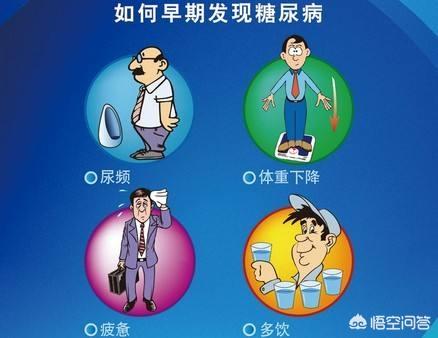
In addition to the typical symptoms, when the autonomic nerve is involved, patients with type 2 diabetes may also experience corresponding symptoms, such as diarrhea, constipation, etc. When the peripheral nerves are involved, limb pain and numbness may occur; some patients may also experience visual impairment and upright hypotension. Female patients may have pubic itching and menstrual disorders, and male patients may have hypogonadism. For the treatment of diabetes mellitus, patients with a short course of disease and little elevation of blood glucose, without serious target organ damage or concomitant diseases can first control blood glucose by controlling diet, increasing exercise, reducing body weight, etc.; in addition to this, specialists should be consulted and given reasonable medication to control blood glucose; for patients whose initial diagnosis of fasting blood glucose is higher than 11.1 mmol/L, or glycated hemoglobin ≥9%, or pancreatic β-cell function is severely impaired, patients should be given reasonable medication to control blood glucose. function is severely reduced, insulin should be initiated to control blood glucose.
To summarize, early diabetes patients lack of significant symptoms, early diagnosis mainly rely on blood glucose test; with the progress of the disease, patients may appear polyuria, polydipsia, polyphagia, weight loss and other typical symptoms, but also atypical symptoms such as diarrhea, constipation, skin itching, limb pain and numbness, etc.; some patients may be asymptomatic.
Thank you all for reading!
We are looking forward to your attention and presenting more health knowledge to you!
Note: The images in this article come from the Internet, if infringement of copyright, please contact to remove. The content of the article is only as a health science popularization, not as a medical advice or opinion, and does not have the condition of medical guidance.
Nowadays, the number of diabetic patients is increasing, as diabetes in the early stage of many is no symptoms, most people think it does not matter, so did not pay attention. But once diabetes has complications, these are irreversible.
1, the most important typical symptoms of diabetes are three more and one less, drink more, eat more, weight loss. That is, the amount of food is more than before, and feel not full still want to eat, compared with the previous body is getting thin, general fatigue and weakness, drink more water, but still difficult to quench thirst. If you have these typical symptoms, you need to check your blood sugar in the hospital. However, most people have atypical symptoms and do not have these obvious symptoms.

2, vision loss, when the eyes appear blurred vision, easy to fatigue, and there is no myopia or presbyopia, you need to check the blood glucose, increased blood glucose leads to increased osmotic pressure of atrial fluid, refractive enhancement or retinopathy caused by diabetes.
3, itchy skin, some early diabetic patients can appear general or localized itching of the skin, vulva, anus itching serious.
4, recurrent infections, persistent vulvar itching, mycosis vaginalis or recurrent skin infections, urinary tract infections, wounds that do not heal easily, but also be careful whether you have diabetes.
5, recurring hypoglycemia, due to diabetes is the pancreatic islet cells secretion of insulin process is slow, when the meal after a longer period of time, may be due to the pancreatic islet cells secretion of insulin too much lead to postprandial hypoglycemia. If repeated panic, dizziness, sweating need to be alert to whether diabetes.
6, symmetrical numbness of the ends of the limbs, because diabetes can lead to peripheral neuropathy and peripheral vascular blockage, so the numbness of the ends of the limbs need to check the blood sugar.
7, sexual dysfunction, especially men with diabetes easily lead to the blockage of tiny blood vessels, will lead to sexual dysfunction, impotence and premature ejaculation. Women show irregular menstruation, or scanty menstruation.

Summary:
Therefore, we should detect diabetes at an early stage and treat it early by observing some symptoms. Especially people over 40 years of age should have routine medical checkups every year, including blood glucose and lipid checkups.
If you have "three more and one less", excessive urination, excessive drinking, excessive eating, loss of weight, loss of vision, wounds that do not heal easily, recurrent vaginitis, itchy skin, recurrent hypoglycemia, numbness of the limbs, and sexual dysfunction, you need to go to the hospital to check if you have diabetes.
Author's message: every day will be updated health knowledge, like the author's creative content, then pay attention to @ Dr. Yang Shuang bar, and my fans can be free of charge to answer health doubts Oh.

When it comes to diabetes, some people don't take it seriously. They eat what they want, drink what they want, and have no dietary taboos. The result is that within a few years, various complications appear. For example, diabetes-induced neuropathy, vasculopathy, etc., let a person a little bitter, this time regret is a little too late.
Thirsty
While most people can satisfy their body's needs by drinking about 1,700 milliliters of water a day, diabetics are prone to thirst because of problems with their metabolism. Especially when diabetics have high blood sugar, they are more prone to thirst. At night you may be in a deep sleep, but some diabetics get up and drink water because they are thirsty, which means that the diabetic's blood sugar is not under good control and some complications have begun to find their way to the door.
pruritus
Itchy skin, probably your reaction is to go to the dermatologist or buy a cream to apply. But don't ignore recurring itchy skin, it could be a problem with your blood sugar. Diabetes has many complications, and itchy skin is one of them. Some women because of high blood sugar can also cause recurrent vaginitis, the reason is that diabetic patients' urine contains a lot of sugar, which provides a good environment for bacterial proliferation, and elevated blood glucose concentration is also caused to a certain extent by plasma and tissue osmotic pressure changes, which will stimulate our nerve endings, thus causing itchy skin.
For diabetics, three more and one less are the main symptoms of diabetics. And if the blood sugar control is not good, the complications will be more and more. The appearance of these complications seriously affects the quality of life of diabetics. With good blood sugar control, complications will also be reduced. In addition to taking medication on time, diabetics should also pay attention to their diet.

If you have a good suggestion for this issue, you are welcome to leave a comment below!
I am Wang Guizhen, today's headline Wukong Q&A signed author, welcome to pay attention to [Wang Guizhen nutritionist] headline number, together to talk about health, so that we eat healthy, eat at ease!
Diabetes is a major disease affecting our health, with a large number of people suffering from the disease, and tends to be younger, we need to pay enough attention to it. As a chronic disease, as long as diabetes adheres to standardized treatment, pay attention to reasonable diet, appropriate exercise, regular medication, and regular follow-up, review, can achieve long-term stable control of the disease and reduce the occurrence of complications.

Diabetes mellitus is a metabolic disease characterized by persistent hyperglycemia. As blood glucose levels rise, a typical diabetic may experience symptoms of polydipsia (manifested by thirst and frequent drinking of water), polyphagia (manifested by easy hunger and consequent increase in eating), polyuria (which is commonly seen to increase during the night), and lethargy, with fatigue and loss of vision being other symptoms.
Of course, in modern society, more diabetes patients are often seen in the obese population, clinical manifestations, symptoms are not typical, easy to be ignored or missed and delayed treatment. The diagnosis of diabetes mellitus relies on the typical symptoms of diabetes mellitus, but the most important thing is to check the venous plasma glucose, mainly focusing on the fasting glucose and two hours after meal glucose.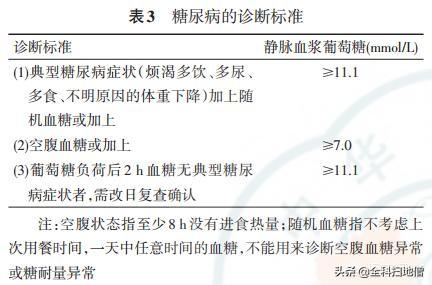
The diagnostic criteria for diabetes are: (1) typical symptoms of diabetes such as excessive eating, drinking, urination and wasting, plus fasting venous blood glucose ≥7.0 mmol/L or two-hour postprandial blood glucose ≥11.1 mmol/L or random blood glucose ≥11.1 mmol/L are diagnostic; (2) if there is no typical diabetes symptom, the above blood glucose levels need to reach the standard on two measurements taken on non-same days. Diagnosis can be made if either of the above two conditions is met.
This article has been written by GP Sweeps and we hope it has been helpful. Please correct any deficiencies, the article is for reference only and is not intended as medical advice.
Diabetes is a chronic killer, but compared to cancer, it is not so terrible, but it also depends on the control of diabetes, although diabetes itself is not a big problem, but if you can't control your blood sugar well in normal times, it will accelerate the arrival of all kinds of complications of diabetes, as we all know, the real danger of diabetes lies in its various complications, and most of the risk of death comes from its complications, the quality of survival also depends on the complications, such as eye disease, diabetes kidney disease, diabetes foot, heart attack, and so on. The quality of life also depends on the complications, such as diabetic eye disease, diabetic nephropathy, diabetic foot, heart attack and so on, these are long-term diabetes prone to complications.

But if you can stabilize your blood sugar in normal times and pay more attention in your daily life. Can be very good to delay the arrival of complications, such as pay attention to keep warm, go out to wear comfortable shoes, to avoid wear and tear or injury on the feet, do not walk barefoot on the gravel road health, etc., in addition to controlling the weight, because diabetes will also increase the risk of other chronic diseases, such as hypertension, high blood pressure, high blood lipids, as well as high uric acid, and if the combination of these chronic diseases, then it will increase the risk of more diseases, so Maintaining a healthy weight is especially important.
What are the symptoms of diabetes? Some of the well-known symptoms of diabetes are "three more and one less", i.e. drinking more, eating more, urinating more, but losing weight. However, it should be noted that this is a typical symptom of type 1 diabetes, and type 2 diabetes is not symptomatic, and type 2 diabetes is also a highly prevalent disease, accounting for 90% -95% of the total incidence of diabetes, most of the incidence of diabetes are detected in the physical examination, and the type 2 diabetes disease is mainly due to environmental factors, such as diet and lifestyle habits, so to want to To prevent diabetes out of the genetic factors can not be done, the rest is to be sure to be on time for medical checkups, as well as to develop a good diet and lifestyle habits, such as: weight control, balanced diet, adequate amount of drinking water, go to bed early and get up early, quit smoking and limit alcohol, moderate exercise.
High blood sugar is a dangerous thing. We need to be concerned about abnormally high blood sugar and find ways to lower it to ensure good health. If you have diabetes and don't control it, it can lead to hypertension, cardiovascular disease, retinopathy, neuropathy and other complications.
Early "Signs" of Diabetes:
01,sore back and swollen feet
When diabetic nephropathy occurs, kidney damage causes low back pain, which makes the feet appear edematous and causes the urine to appear foamy.
02,arteriosclerosis
When diabetic nephropathy occurs, the body will excrete a large amount of proteinuria, causing hypoproteinemia, and the body will have edema, especially the swelling of both lower limbs is obvious.
03,high blood pressure
The goal of blood pressure control should be less than 130/80 mm Hg.
04,Just because your vision is fine doesn't mean your fundus is fine.
Diabetic retinopathy often progresses unnoticed, and it can be difficult to cure it when the patient does feel blurred vision and develops hemorrhages in the bottom of the eye.
05,Frequent poor appetite, bloating and constipation
In diabetic autonomic neuropathy, it can cause bloating and constipation. Leg pain at night may be diabetic neuropathy caused by diabetes damage to peripheral nerves.
06,Leg pain at night
May be diabetes damage peripheral nerves caused by diabetic neuropathy; may also be diabetic lower extremity vasculopathy signal, often accompanied by limb cold.
Many sugar addicts will be worried about their poor blood sugar control, obviously take medication on time every day, why is the blood sugar still fluctuating high and low? In fact, in addition to medication, there is also a great relationship with daily lifestyle, so we must maintain good habits in daily life.
01,Eat small, frequent and regular meals
Eat at least three meals a day, and should be regular, quantitative, and the interval between meals should be 4-5 hours. You should also add 2-3 extra meals between the three main meals, that is, from the three main meals, a part of the food is set aside for extra meals, which is an effective measure to prevent hypoglycemia.
It is important to remember that smaller meals are consumed in small quantities. Some people mistakenly think that extra meals are added on top of the limited number of meals, thus increasing the size of the meal, resulting in an increase in blood glucose.
02,Getting enough sleep
Diabetic patients should insist on going to bed at 10:00 p.m. every night and ensure eight hours of adequate sleep. Irregular work and rest will cause endocrine disorders, resulting in reduced insulin secretion, so regular work and rest is also very important, it is recommended to develop the habit of going to bed early and waking up early and do not stay up late, to ensure that eight hours of adequate sleep every day is the basis for stabilizing blood sugar.
03,Avoid sedentary lifestyle and keep exercising
Studies have shown that people who are sedentary for long periods of time have two times the risk of diabetes, heart disease or premature death than those who are active.
Therefore, moderate exercise can prevent and delay the onset of diabetic complications.
It is recommended that exercise should follow the "1357" principle:
Specifically, 1 exercise session of no less than 30 minutes, and no less than 5 sessions per week; and
The intensity of exercise should be hot, sweaty but not sweaty, and the pulse rate should be controlled at: (170-age), so that the exercise is effective and safe.
Exercise for diabetics is best done by walking, preferably 1 hour after a meal.
04,control emotions
Nervousness, agitation and other bad emotions affect the body's endocrine level, usually inhibit insulin secretion and promote the secretion of thyroxine and adrenaline, so that the patient's blood glucose rises, so life control of emotions is also the key to lowering blood glucose. It is recommended to treat things with a calm and peaceful mind, and always keep optimistic and positive emotions.
In conclusion, diabetes is a complex and difficult disease to manage. Despite dietary and pharmacologic control, many patients still struggle to achieve ideal blood glucose. Even so, complications are directly related to individual differences and individual levels of control. That is why there is no specific time for diabetic complications. Therefore, it is important for diabetics to be aware of the need for more regulation.
Warm Tip:Diabetic patients need to pay attention to according to the drug and diet together to regulate, but also pay attention to their mood problems can not be ignored, too much pressure, for the treatment of the disease, there is no good effect.
For more health information, welcome to pay attention to WeChat public number "Beijing Nursing Life Hall Pharmacy".
This question and answer are from the site users, does not represent the position of the site, such as infringement, please contact the administrator to delete.